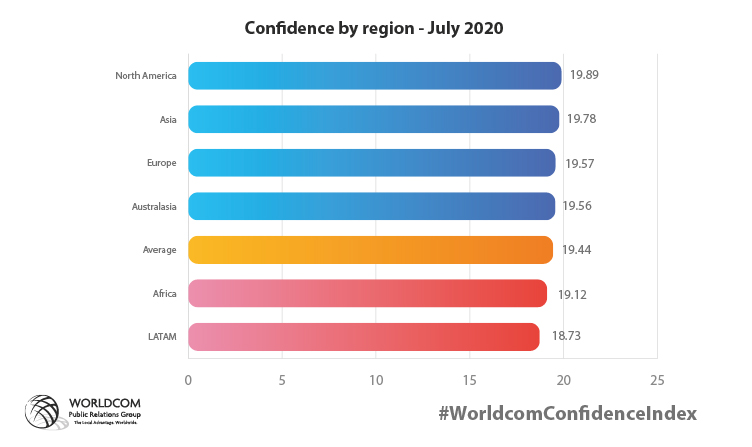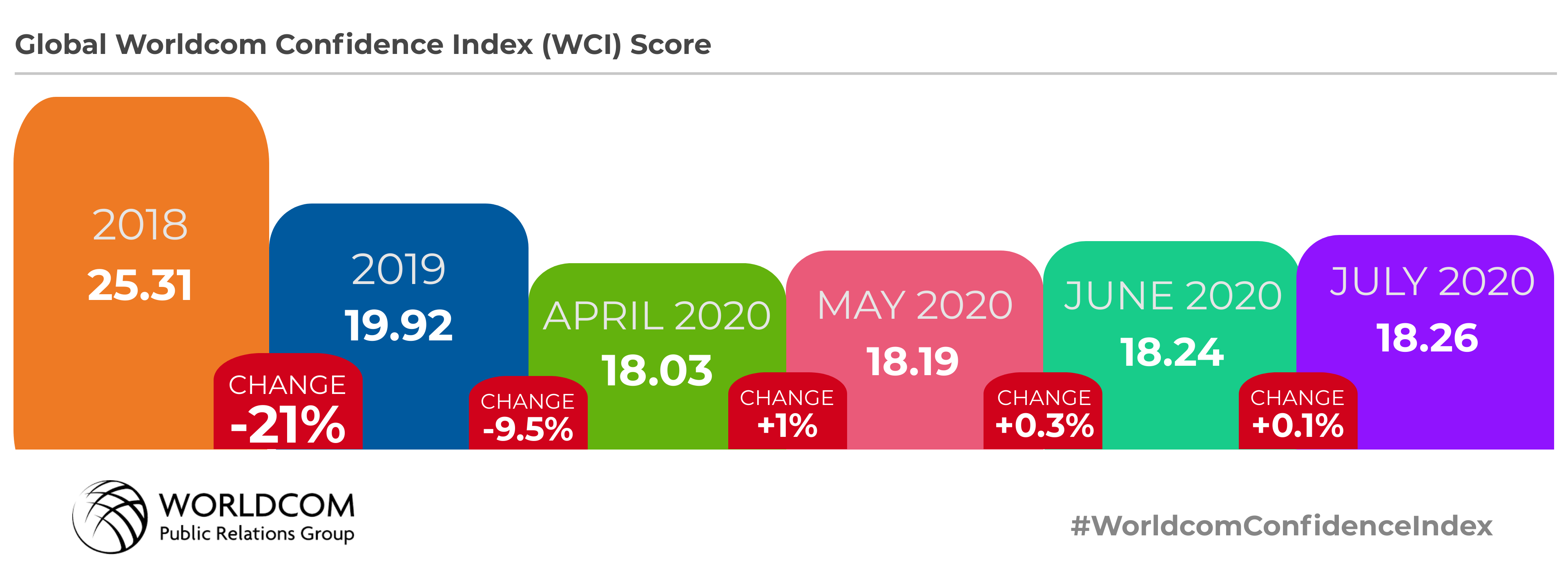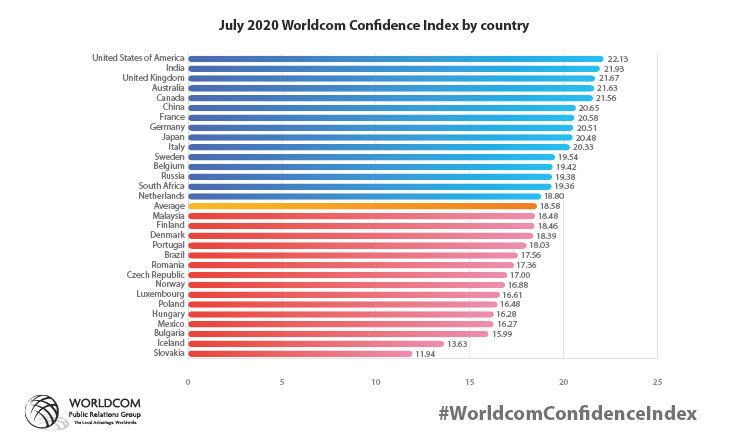July 2020 Global Results
Worldcom Confidence Index (WCI) monthly report for July 2020 shows there was a marked increase in the confidence of leaders in countries emerging from the lockdown. Leaders in China had the highest increase – up 26% and the confidence of CEOs and CMOs from The Czech Republic, Sweden, Italy, the Netherlands, Russia, Finland, Poland, Denmark and Belgium increased between 20% and 24% from the June levels. As some of these countries have seen the virus reemerge since July, confidence levels may decline in August.
The Chinese increase is over three times the increase in the U.S. (8%) where some individual states continue to struggle with the impact of the pandemic. Confidence in the UK improved by only 12%, as local lockdowns and the spectre of Brexit dampened down confidence.
The Worldcom Confidence Index highlights CEO/CMO confidence and concerns across 23 topics and six audiences. We have outlined the top 10 findings for July in what we call “The Worldcom Confidence Index 10.” The July WCI 10 shows the main changes since June 2020.
Download the July 2020 Worldcom Confidence Index 10
View More Worldcom Confidence Index Videos
While global confidence remained flat, countries emerging from lockdown saw a surge in confidence. But will this be sustained if the virus returns?
Leaders focused on the new skills needed to succeed in a world changed by COVID-19
Upskilling and reskilling saw the largest rise in engagement since June – up 63% and remained the #1 topic for leader attention. Engagement levels for retaining talent increased by 56% – making it the #2 topic for leader attention.
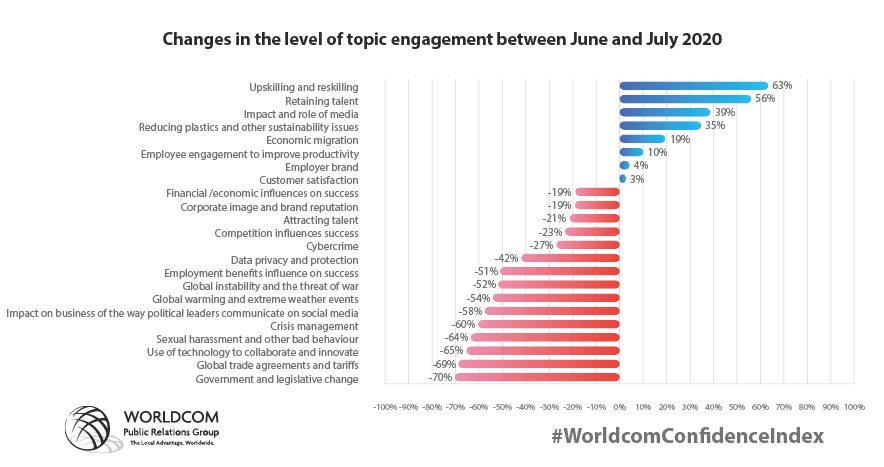
Confidence in using technology to collaborate and innovate saw the largest rise in confidence – up 38% since June
This topic is #2 on the Worldcom Confidence Index in July.
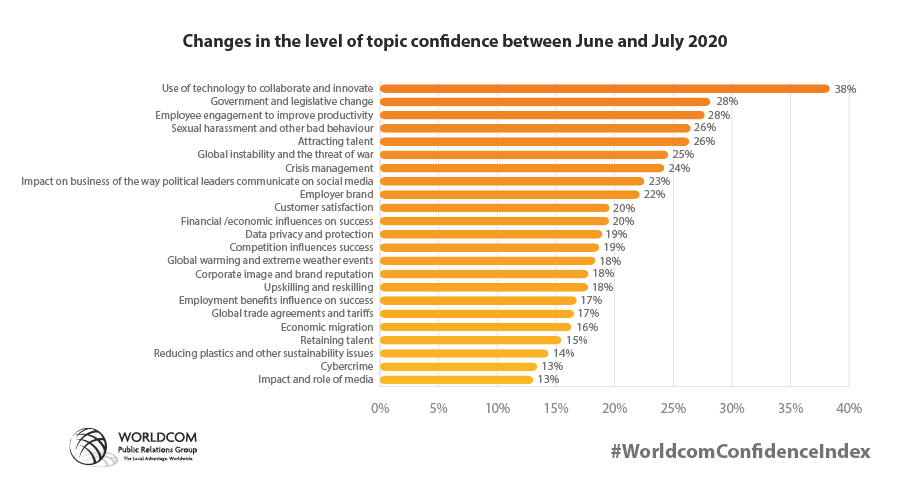
Global trade agreements and tariffs was the topic of most concern for both CEOs and CMOs
Confidence in global trade agreements fell six places since June and is now bottom of the WCI.
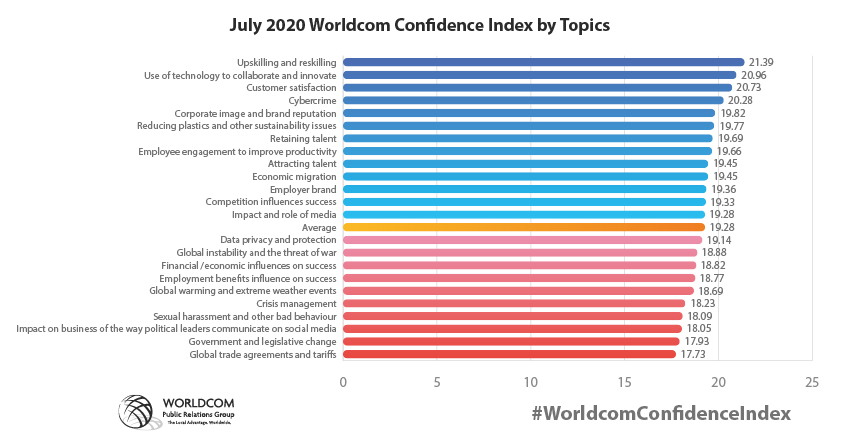
Leaders from Portugal had the lowest confidence about global trade agreements and tariffs. France – the most confident country on the WCI for this topic – had confidence levels over two and a half times higher than Portugal.
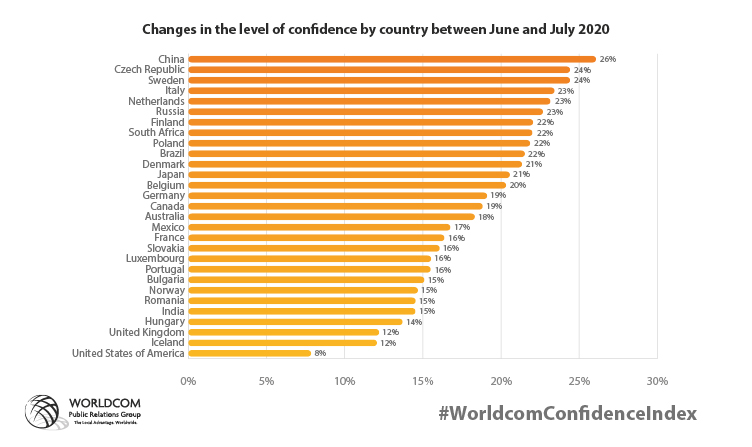
Employee related topics took five of the top seven topics in terms of leaders’ attention and engagement, and five of the eight topics that saw an increase in engagement from global CEOs and CMOs.
- Upskilling and reskilling – the #1 topic (up 63%)
- Retaining talent – the #2 topic (up 56%)
- Economic migration – the #5 topic (up 19%)
- Employee engagement – the #6 topic (up 10%)
- Employer brand – the #7 topic (up 4%)
The Worldcom Confidence Index (WCI) is a living study that uses a breakthrough approach powered by artificial intelligence (AI), which allows us to discover the issues that concern leaders globally – and their confidence levels in addressing them. Topics and sentiments are drawn from online conversations of over 54,000 CEOs and CMOs around the world.
July’s update to leaders confidence and concerns draws upon content created by CEOs and CMOs from all around the world. A detailed picture is now available for 30 countries from Malaysia to Russia and Belgium to Canada. This is double the number reported on in May and further proof of Worldcom’s desire to provide global, regional, and local insight that assists decision-making by business leaders.
The WCI provides a ‘moving window’ view on the issues that are uppermost in CEOs/CMOs minds as they respond to the rapidly changing landscape of the COVID-19 pandemic and navigate other significant business challenges.
The Worldcom Confidence Index (WCI) 10
Hungarian leaders had the lowest confidence in the ability to upskill and reskill at just 11.95. Japanese leaders’ confidence was almost three times higher at 34.55, making Japan the #1 country on the WCI for this topic.
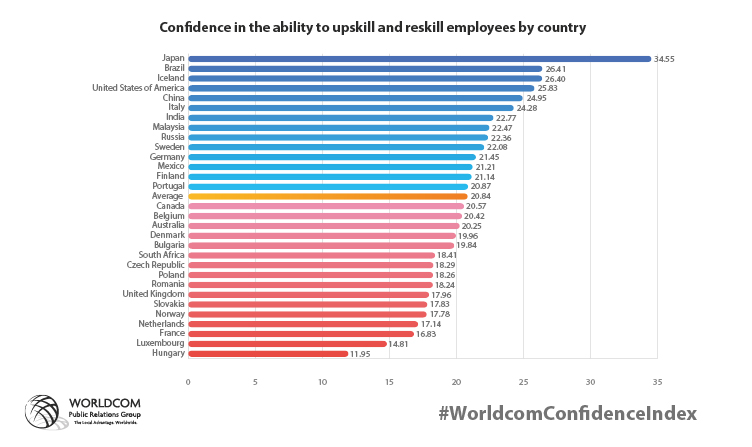
Influencers continued to extend their lead as the #1 audience for leader attention – up 26% since June
With so many issues to contend with – from COVID-19, to recession, extreme weather and diversity and inclusion – leaders are looking to influencers to help address these concerns.
In July, influencers – including new types of influencers – extended their lead as the audience leaders think should get the most attention – up 26% since June.
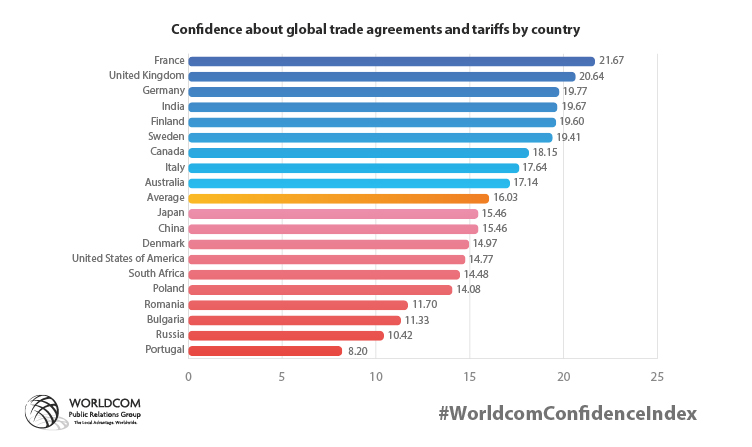
Another interesting result was the increase in confidence of the two youngest age groups. Millennials became the second most confident age group behind leaders over the age of 65. This may be a result of their desire to be purpose driven. A report by Deloitte in October 2019 identified higher performance by purpose-driven companies.
Leaders in Generation Z saw the biggest leap in confidence in July – up 22%. This may be a function of them being more comfortable than other age groups with flexible working and home working.
North America’s leaders remained the most confident out of all regions in July but saw the smallest increase in confidence at just 4%. They were most confident about upskilling and reskilling and least confident about handling issues such as sexual harassment and other bad behavior. Latin America’s leaders saw the biggest rise in confidence since June (up 20%) , but their confidence level is still the lowest of all Regions. They were most confident about upskilling and reskilling and least confident about cybercrime.
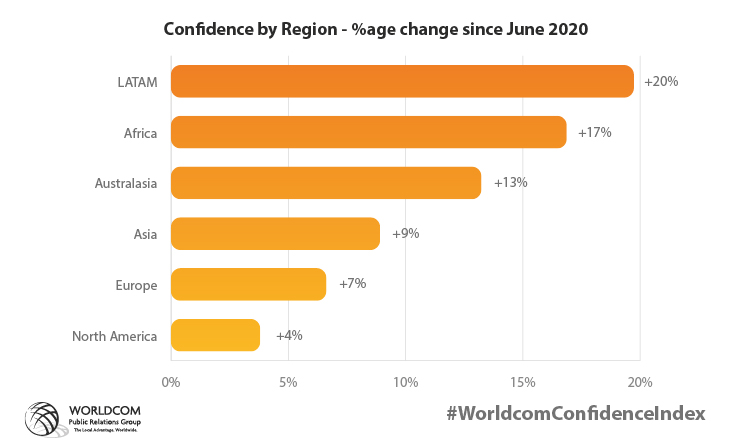
Malaysia, the latest country to be added to the Worldcom Confidence Index, is #16 on the country list with a score just below average
Leaders in Malaysia were most confident about upskilling and reskilling and least confident about handling issues such as sexual harassment and other bad behaviour. They had the highest topic engagement with retaining talent and lowest with government and legislative change.
Artificial Intelligence provides unrivalled view of trending topics and leaders’ confidence and concern in addressing them
As for the 2019 Worldcom Confidence Index, the study was able to operate at this scale, and in nine different languages, because the data was captured using a breakthrough approach powered by artificial intelligence (AI), which allowed us to discover the issues that concern leaders – and their confidence levels in addressing them. The chosen research firm, Advanced Symbolics Inc. (ASI), has developed a patented method of building representative samples and then capturing information with their AI tool. By using ASI’s AI tool, we have produced a truly global perspective on the business issues of the moment and where they rank in terms of leadership attention. We’ve also calculated the confidence index level for every topic and audience and identified how this changes around the world. This is incredibly valuable insight because it not only represents what leaders are talking about, rather than responses to questions, but also shows their confidence or concern in addressing each topic. It means you can compare your own thoughts with more than 54,000 of your global peers.
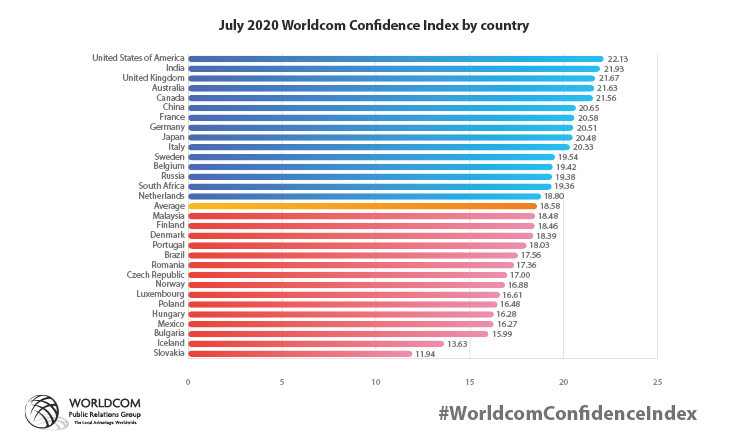
Leaders in Russia and Bulgaria had the lowest confidence in the ability to protect a brand in a crisis – both below nine points on the WCI. The U.K. – the #1 country on the WCI for crisis management – had confidence levels over two and a half times higher than Russia.
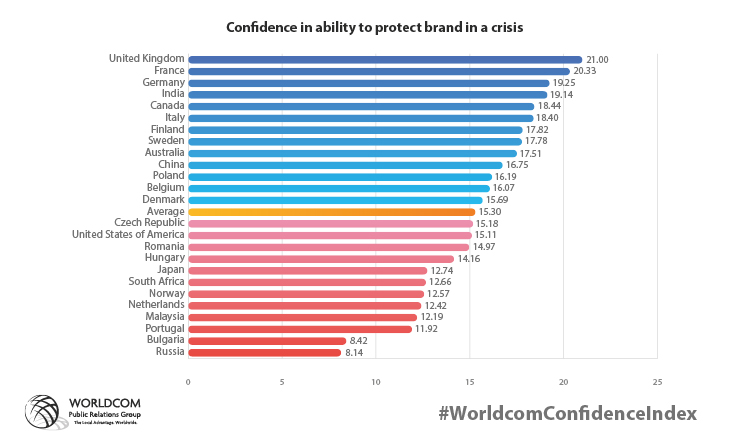
However, confidence in the ability to satisfy influencers had the lowest increase of all audiences in July – up just 4%.
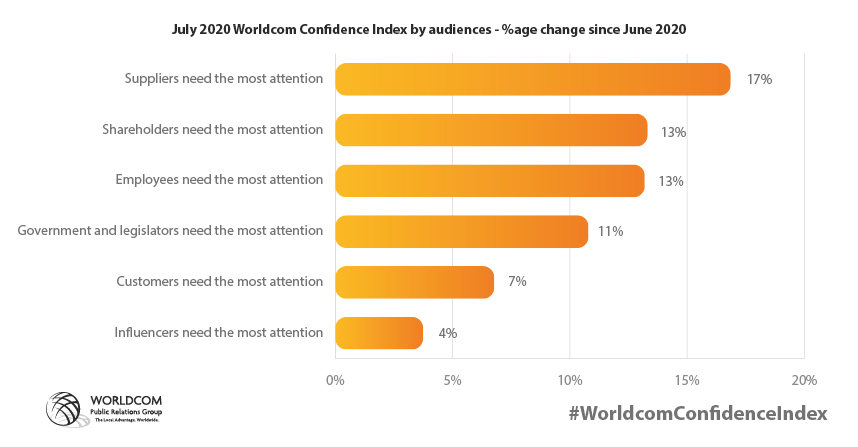
Australasia’s leaders were most confident about cybercrime and least confident about retaining talent. Asia’s leaders were most confident about upskilling and reskilling and least confident about employee benefits. Europe’s leaders were most confident about the use of technology to collaborate and innovate and least confident about reducing plastics and other sustainability issues. African leaders, like those in North America, were most confident about upskilling and reskilling and least confident about handling issues such as sexual harassment and other bad behavior.
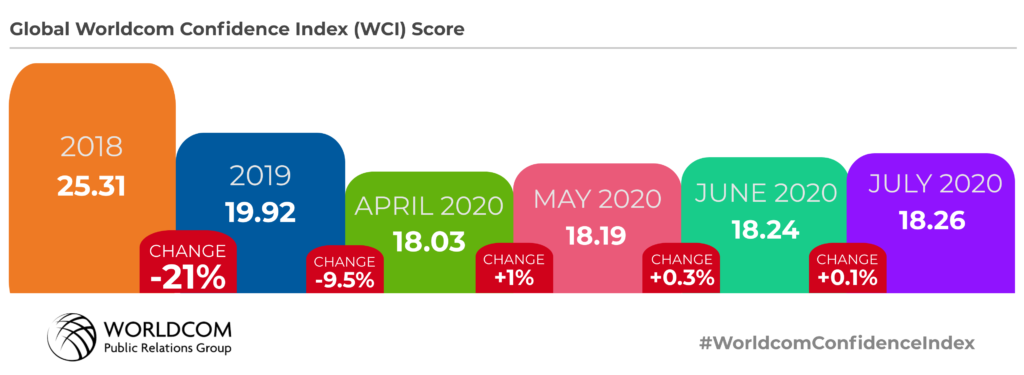
The importance of employee engagement to increase productivity saw the second largest increase in confidence since June – rising 28% and eight places on the WCI
Leaders from Slovakia had the lowest confidence in the ability to drive engagement through employee engagement at just 3.86. Leaders from China – the #1 country on the WCI for this topic – had confidence levels almost six times higher than Slovakia at 23.01.
Millennial leaders became the second most confident age group
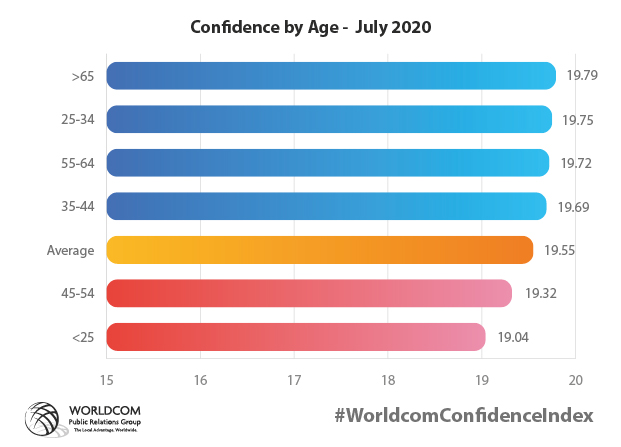
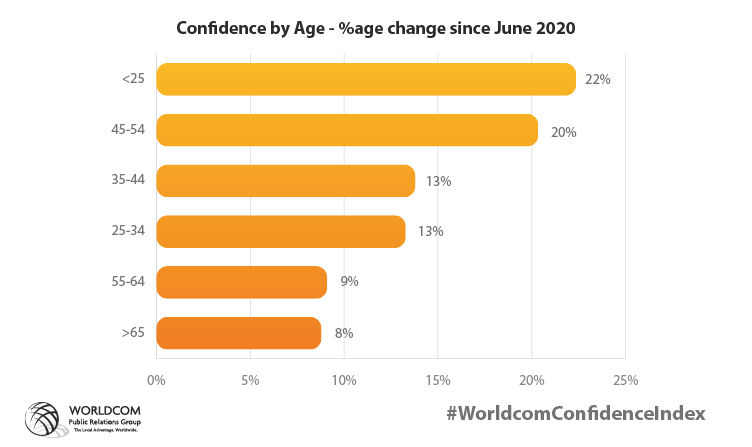
Crisis management and sexual harassment remained in the Top 5 topics of concern for both CEOs and CMOs
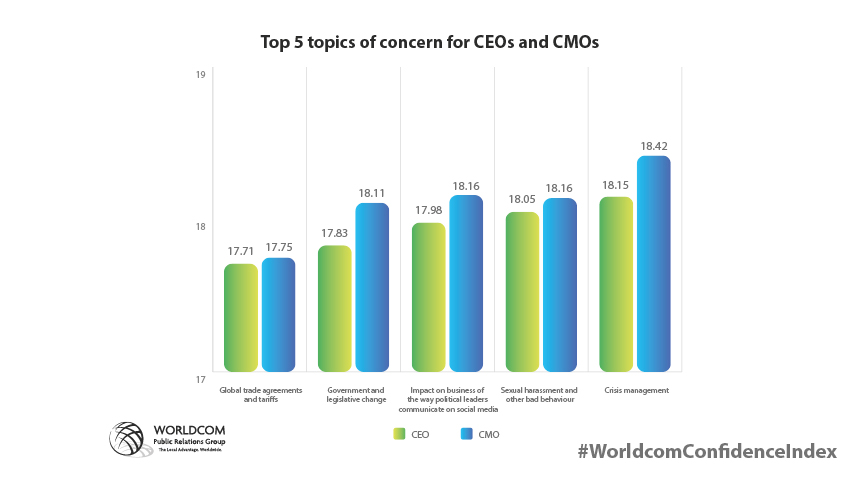
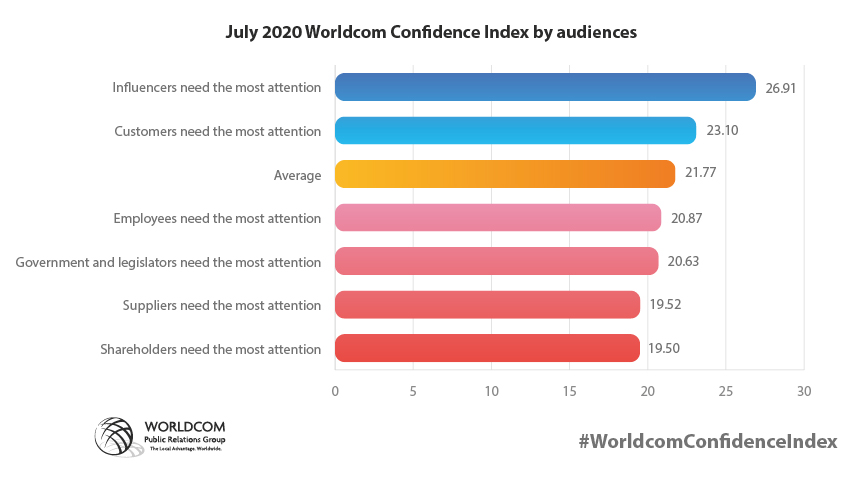
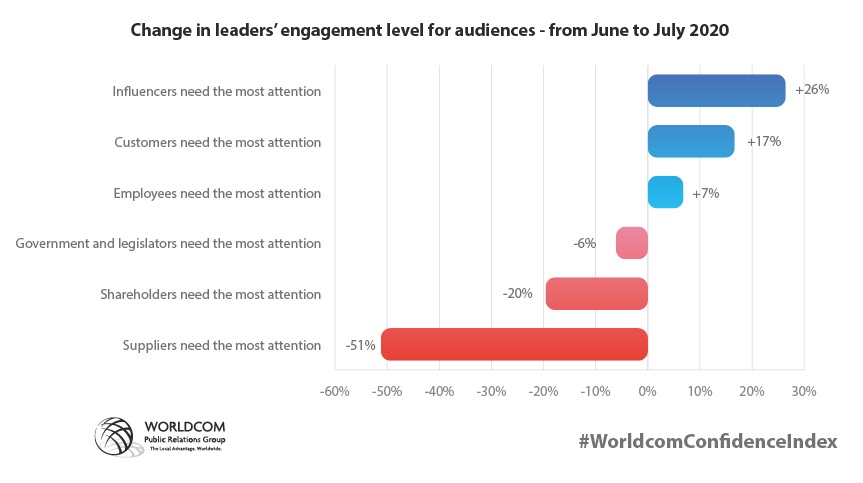
Latin America had the lowest confidence score for a Region but saw the largest increase in confidence since June
